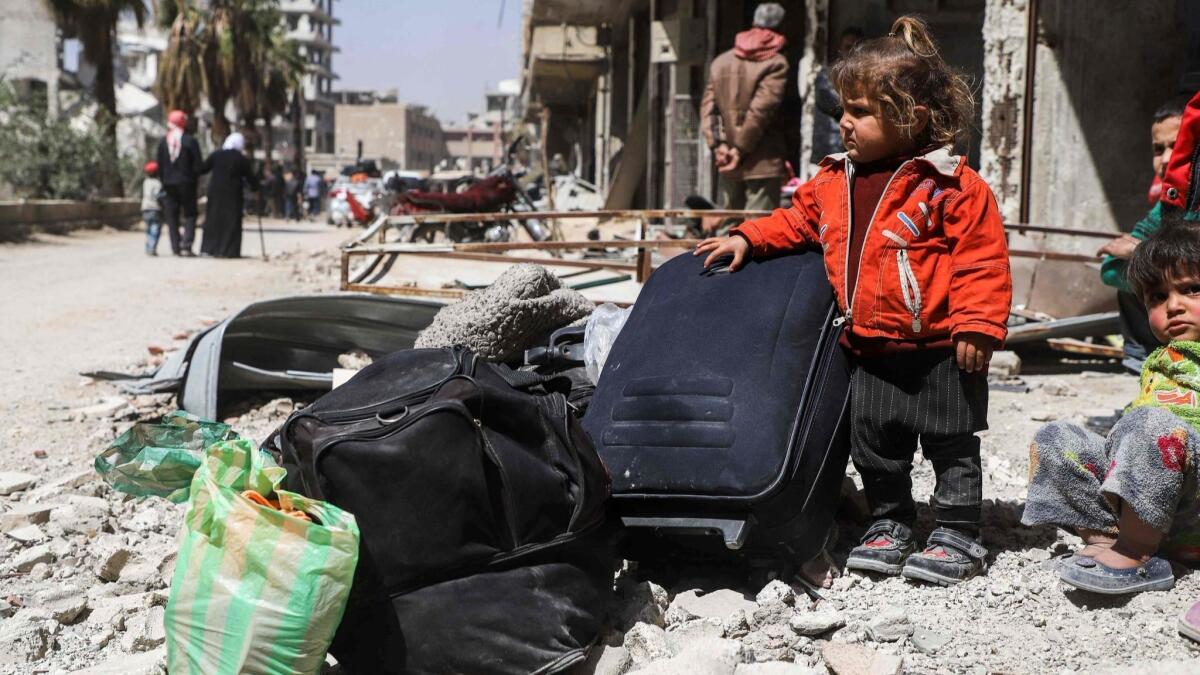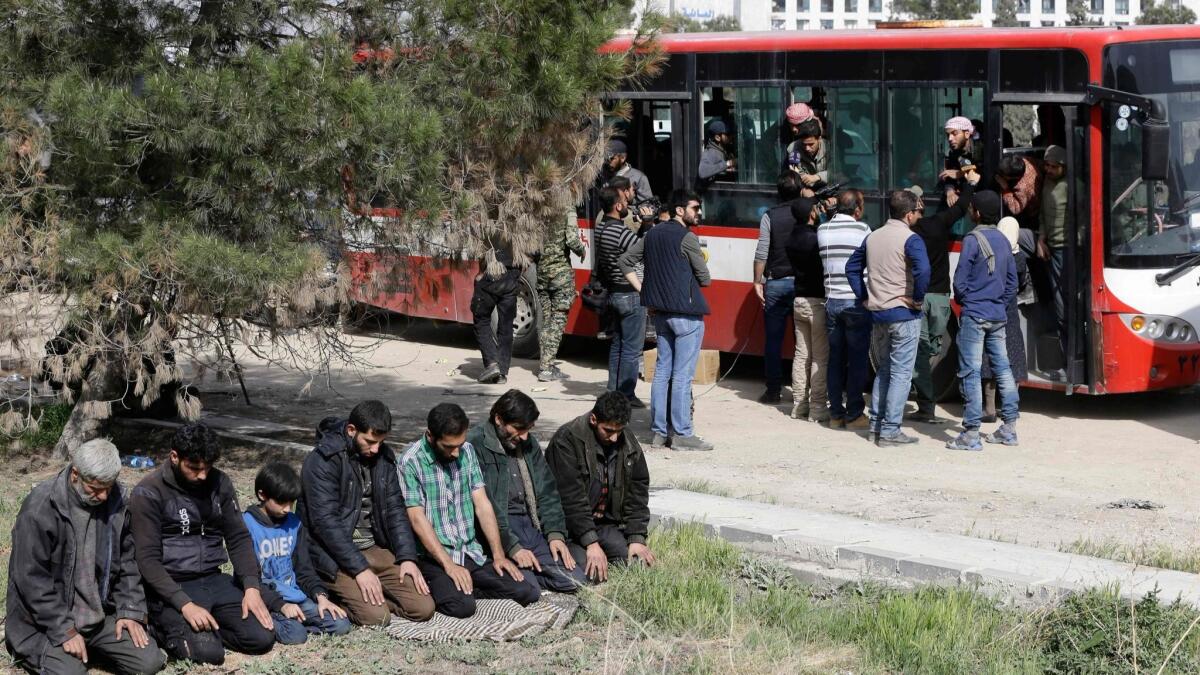After weeks of heavy bombardment, hundreds of Syrian rebels and civilians bused out of Ghouta

- Share via
Reporting from Beirut — Hundreds of Syrian rebels and civilians were bused out of a second pocket of the besieged eastern Ghouta suburbs of Damascus on Sunday after rebels agreed to leave several towns and villages after years of siege and weeks of heavy bombardment.
Close to 900 people were evacuated from the southernmost of three eastern Ghouta pockets Sunday, according to state-affiliated Ikhbariya TV, following some 1,000 fighters, family members and other civilians who departed late Saturday, as reported by the Syrian Observatory for Human Rights.
They left in a fleet of buses, including the lime-green municipal buses that have come to symbolize defeat for the Syrian opposition and the rearrangement of Syria’s population as the government takes back control of cities around the country.
Fighters dressed in fatigues slumped in their seats and hid their faces from roadside news cameras, while children peered out of the open windows.
Many are unsure if they will ever be able to return.
“I’m going to visit the tomb of my father [for the] last time,” tweeted Muhammad Najem, a 15-year-old boy who said he was going to board the buses to Idlib, a rebel stronghold in northwest Syria.
“We are going on an unknown journey to the refugee camps in Idlib. We don’t know what is our fate there,” said Najem in a separate video tweet.

The evacuation is modeled on others in which rebels have surrendered swathes of territory around the capital and other major cities after years of siege and bombardment at the hands of President Bashar Assad’s forces. They have been helpless against the government’s overwhelming artillery and air power, boosted with support from Iran’s Revolutionary Guard and Russia’s air force.
Rebels belonging to the Ahrar Sham and Faylaq Rahman factions began evacuating the central pocket of eastern Ghouta on Thursday. Some 7,000 people left the town of Harasta, bound for Idlib.
Fighters loyal to the Al Qaeda-linked Levant Liberation Committee also began evacuating eastern Ghouta on Sunday, according to the Observatory.
Rebels with the powerful Islam Army faction still controlled Douma, the largest town in eastern Ghouta, and the third and last pocket in the eastern Ghouta enclave. A delegation representing the town was in talks with Russia to reach a settlement that would have Russian forces deployed inside.
Charities supporting the medical sector in Syrian opposition areas say evacuees were arriving to Hama, on the road to Idlib, bearing the marks of trauma, malnutrition, and other afflictions commensurate with the siege of eastern Ghouta. For four weeks, residents had to hide in overcrowded basements as the government shelled and bombed the region without pause.
The Union of Medical Care and Relief Organizations said children and adults were arriving with intestinal infections, hepatitis, skin diseases and trauma injuries.
Basel Termanini of the Syrian American Medical Society told journalists that hospitals were filling up quickly and patients requiring critical care were being transferred to Turkey.
More than 1,600 people were killed in the five weeks that the government assaulted eastern Ghouta, after holding it under siege since 2013, according to the Observatory.
The Syrian government is giving rebels and male residents the choice of laying down their weapons and signing up for military conscription or leaving with their families to rebel-held territories elsewhere in Syria. Tens of thousands across Syria have elected to leave with their families instead of serving or risking arrest by the state’s notorious security services.
Critics say the evacuations amount to forced displacement that legitimizes the government’s brutal siege tactics, which have deprived hundreds of thousands of civilians of food and medicine and subjected them to years of violence. U.N. inquiries and top U.N. officials have likened the tactics to war crimes and crimes against humanity.
The U.N. and the International Committee of the Red Cross have refused to facilitate the eastern Ghouta evacuations.
Close to 11 million people have been forced from their homes by the violence that has swept through the country since the government began cracking down on Arab Spring protests in 2011.
The government has restored its authority in most of the major population centers across the country, but there are few indications that refugees and the internally displaced are returning to their homes in large numbers.
Many of the cities and towns once held by the opposition have been razed by government forces, and resources and funding for reconstruction are scarce.
More to Read
Sign up for Essential California
The most important California stories and recommendations in your inbox every morning.
You may occasionally receive promotional content from the Los Angeles Times.













